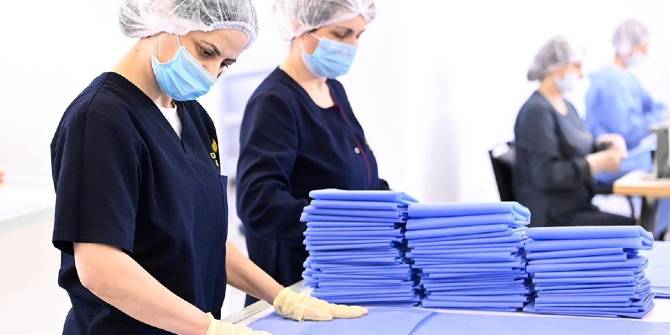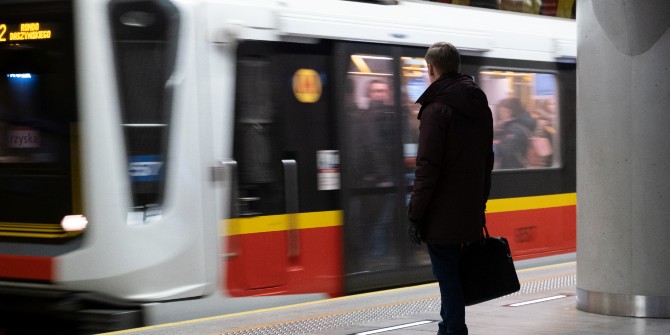As lockdown eases, employers will bring back some of their staff before others. Drawing on their research into the negative effects of downward income mobility, Paul Dolan and Grace Lordan (LSE) suggest they take into account people’s preferences, and bring back those who are keenest to return to work first.
We know poverty is bad for wellbeing. But how much of an impact does getting poorer have? In our forthcoming paper in the Review of Economics and the Household (Dolan and Lordan, 2020), we examined how upward and downward intergenerational income mobility impacts on mental health and wellbeing for a cohort of children born in 1970 in the UK. Overall, we find that downward income mobility negatively affects mental health and wellbeing, independent of the level of income itself. Earning £100 less than your parents on a weekly basis (which is less than the movements experienced by the average person in the data we consider), gives the same deterioration to life satisfaction as being unemployed has been shown to impact on life satisfaction. We also present convincing evidence that the deteriorations in mental health and wellbeing experienced operate partly through financial perceptions (i.e., how a person is feeling about their financial situation).

Our findings are very relevant today at a time when many people in the UK are experiencing downward income mobility because of the lockdown response to COVID-19, and the changes in consumption patterns and feelings of financial security that go with such a change. By the start of May 2020 official government figures already showed that over 1.8 million people applied for the government’s universal credit benefit since the lockdown began on 16 March. This also does not capture the many other citizens who have had their income decline sharply because of being furloughed or having hours cut, or self-employed people who fall outside of the government’s safety net. At the time of writing, 6.3 million jobs are furloughed in the UK.
The impact of the response to Covid-19 is likely to dwarf the already large effects we identify in our study. First, the declines in income because of job and income loss during the COVID-19 lockdown response have been larger than the variation we use to identify effects in our study. Second, they have also been very unexpected. Third, they have been accompanied by high levels of uncertainty about when and in what ways the lockdown will be lifted – the government’s roadmap is conditional on keeping the infection rate low. Fourth, the COVID-19 crisis is unique because negative income shocks have been accompanied with negative health shocks.
Many people are also very scared, not just of the virus, but about what their income flows will be like in the future. This will be having its own significant and potentially long-term effect on mental health. There is strong evidence that long periods of stress greatly affect physical health too, and so a vicious cycle between declines in mental and physical health are being set in motion without any clear attempt to mitigate them.
Over the next weeks the UK will further relax its lockdown constraints. We suggest that policy makers should consider more than just the risk of contracting COVID-19 on the job (risk) and the income generated by an employee (added value to the economy) when choosing who goes back to work first. These are certainly two important parameters – but our work clearly emphasises that changes in status, in and of themselves, have independent negative effects on wellbeing and mental health.
How can this be incorporated into the phased return? The utility an individual gets from working can be incorporated into the decision-making process, along with the fear an individual has about returning to work. Both these parameters determine what an individual’s experience will be upon returning to work, and the effects it will have on wellbeing and mental health. We recognise that most workplaces will bring a proportion of their employees back to allow for physical distancing. For jobs where workers are more productive on site, learning about individual preferences of employees can help determine who goes back first, allowing those who are excited to be integrated back to work an opportunity to return earlier, with those who are fearful given an opportunity to cocoon for a longer period of time. To avoid gaming, employers might need to offer different incentives to those two groups of employees, recognising that those who come on site are probably more productive.
This post represents the views of the authors and not those of the COVID-19 blog, nor LSE.
We are both very much looking forward to being back again on the LSE campus teaching students in behavioural science.






1 Comments